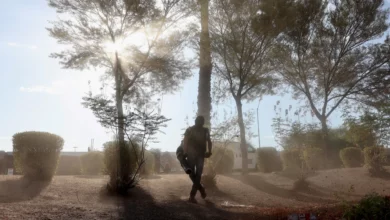An international review panel on Monday called on the UN global climate change body to carry out fundamental reforms after embarrassing errors in a landmark report dented its credibility.
The Nobel Peace Prize-winning Intergovernmental Panel on Climate Change (IPCC) was caught in an international storm after it admitted that its landmark 2007 report had exaggerated the speed at which Himalayas glaciers were melting.
The review panel said the IPCC has been "successful overall" but called for leadership changes, stricter guidelines on source material and a check on conflicts of interest.
The five-month probe ordered by UN Secretary General Ban Ki-moon said the IPCC should have a stronger scientific basis for making its predictions and recommended an overhaul of the position of Rajendra Pachauri, the IPCC chairman.
The InterAcademy Council, which groups 15 leading science academies, was brought in to carry out the study after an uproar over the IPCC's landmark 2007 study that critics called the "Climategate" scandal.
The 2007 study highlighted evidence that climate change was already hurting the planet, building momentum for global action to limit carbon emissions that mostly come from burning coal, gas and oil.
But in the run-up to a climate summit in Copenhagen in 2009, the IPCC was rocked by a scandal involving leaked emails which critics say showed that they skewed data.
The mistake over the Himalayas glaciers–a claim which was found to be sourced to a magazine article–and an earlier error over how much of the Netherlands is below sea level also tainted the IPCC image.
"I think the errors made did dent the credibility of the process–there's no question about it," said Harold Shapiro, a former president of Princeton University who led the review.
"Trust is something you have to earn every year," he told reporters. "We think what we recommended will help."
The IPCC has admitted its mistakes but insisted that its core conclusions about climate change are sound.
The review said the glacier reference showed that the IPCC did not pay close enough attention to dissenting viewpoints.
"There were a number of reviewers who pointed out that this didn't seem quite right to them and that just was not followed through," Shapiro said.
The UN review said that guidelines on source material for the IPCC were "too vague" and called for specific language, and enforcement, on what types of literature are unacceptable.
The review called for a new chief executive to run the IPCC and for the chairmanship to become a part-time post with a new holder for each landmark study carried out.
Pachauri, an Indian scientist primarily employed by the TERI think-tank, has come under criticism, with some arguing that he had a vested interest by business dealings with carbon trading companies. He has strongly denied any conflict of interest however.
Pachauri told a press conference after the report that he would let member-states decide his future. The 194 nation IPCC is to hold a general meeting in Busan, South Korea in October.
The IPCC chairman criticized what he called "ideologically driven posturing" in the attacks on the climate group, which shared the 2007 Nobel Peace Prize with former US vice president Al Gore.
Shapiro said that the review was not criticizing Pachauri. "It was not motivated by or in any way connected to Dr. Pachauri or any other leader in IPCC," he said.
In Brussels, European Climate Action Commissioner Connie Hedegaard said that "after all the fights" the main findings of the 2007 report are "still unchallenged."
"The bottom line, and this report says it, is that overall the IPCC has done a very good job, but there were some minor errors and they were corrected," she told AFP.
Since the 2007 study, momentum for a post-Kyoto treaty on climate change has dwindled with critics seizing on the errors to challenge the scientific basis behind climate change.
Environmental group Greenpeace welcomed the review and pointed to severe weather this year–including Pakistan's flood disaster and Russia's worst-ever heat wave–as evidence of global warming.
"Despite the muckraking and crude attempts to undermine the findings of the IPCC, the scientific consensus is clear, climate change represents a serious threat to the future of the environment and humanity," Greenpeace said.




